Charles E W Bean, Diaries, AWM38 3DRL 606/41/1 - March - April 1916 - Part 1
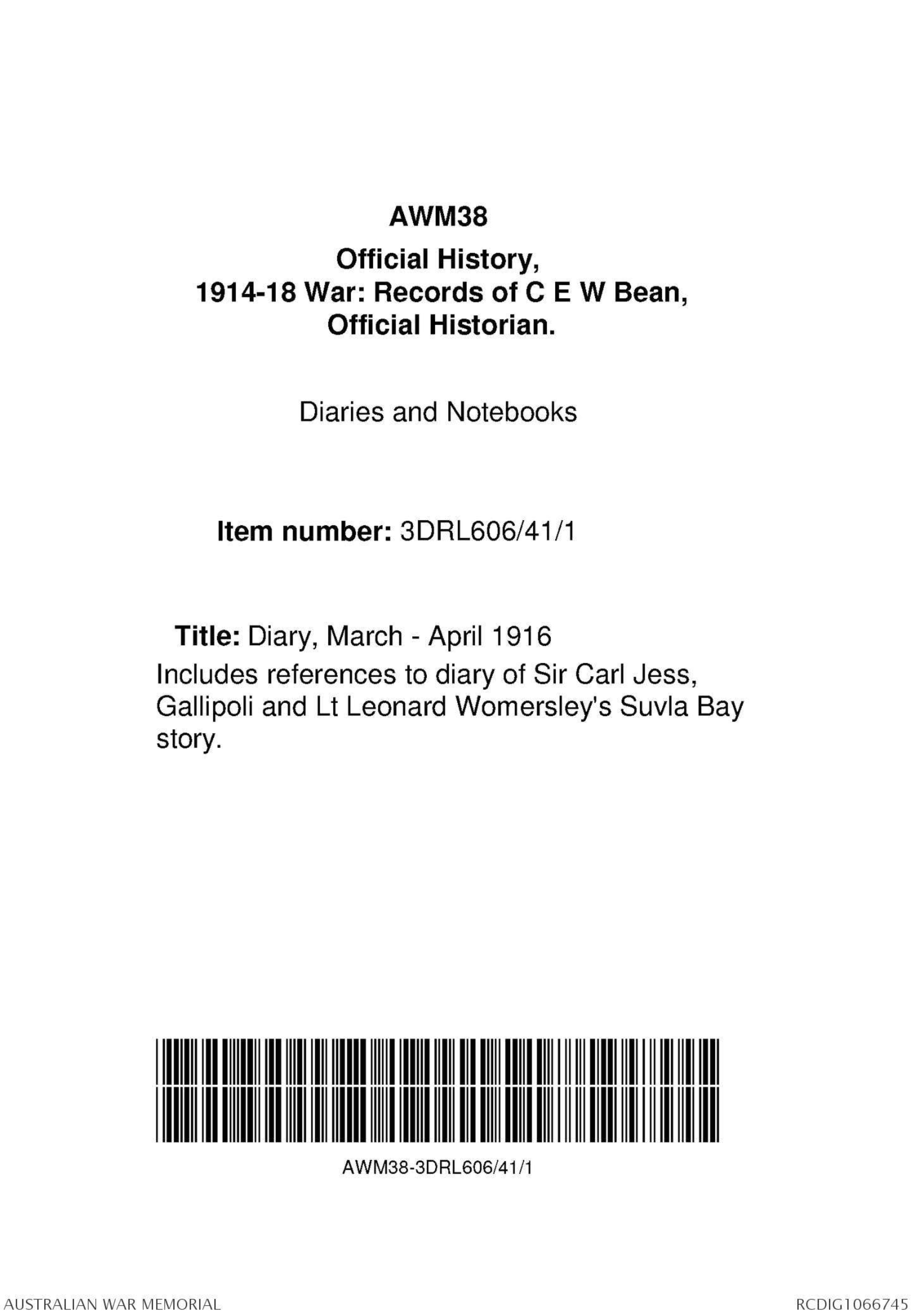
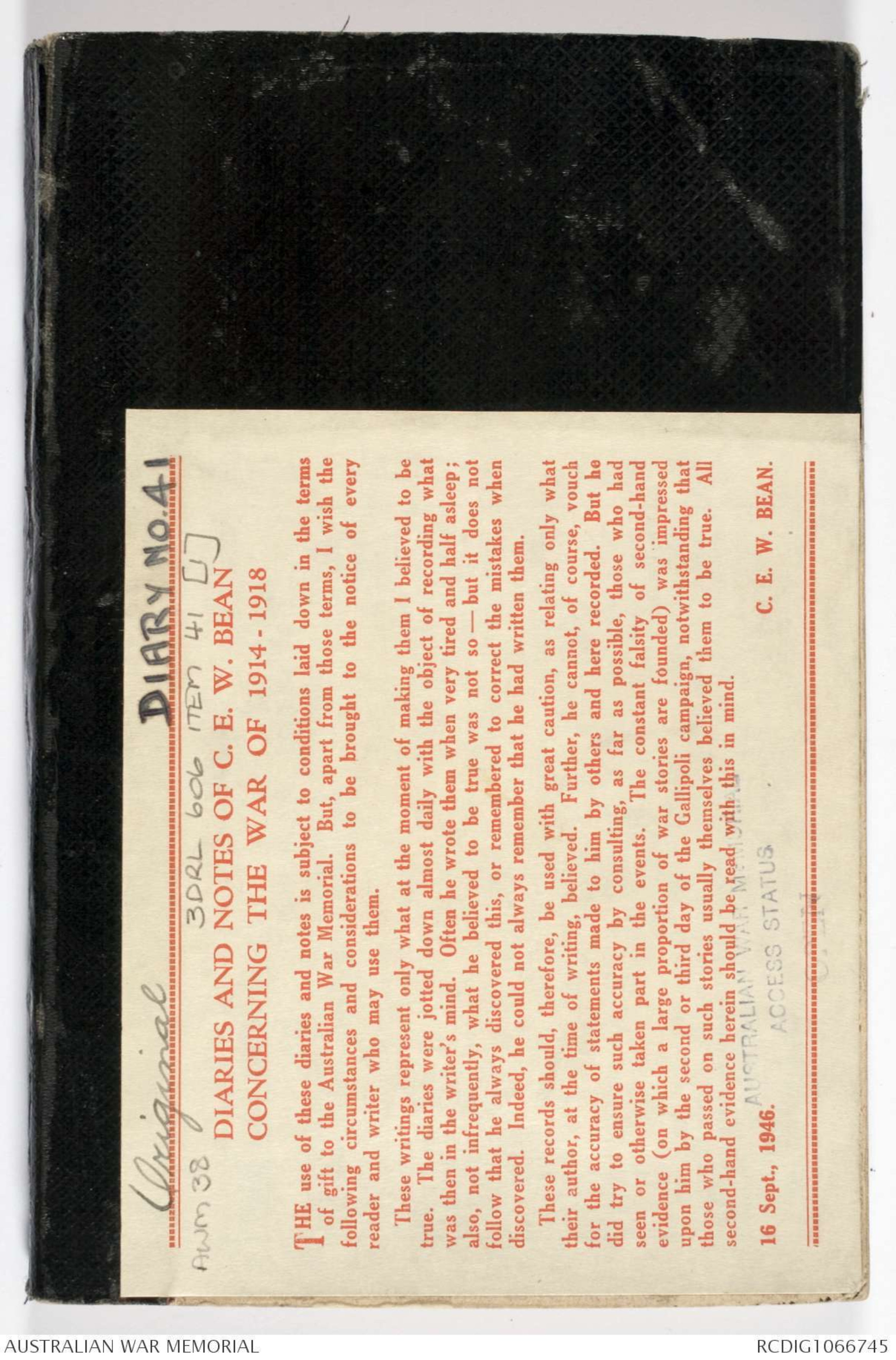
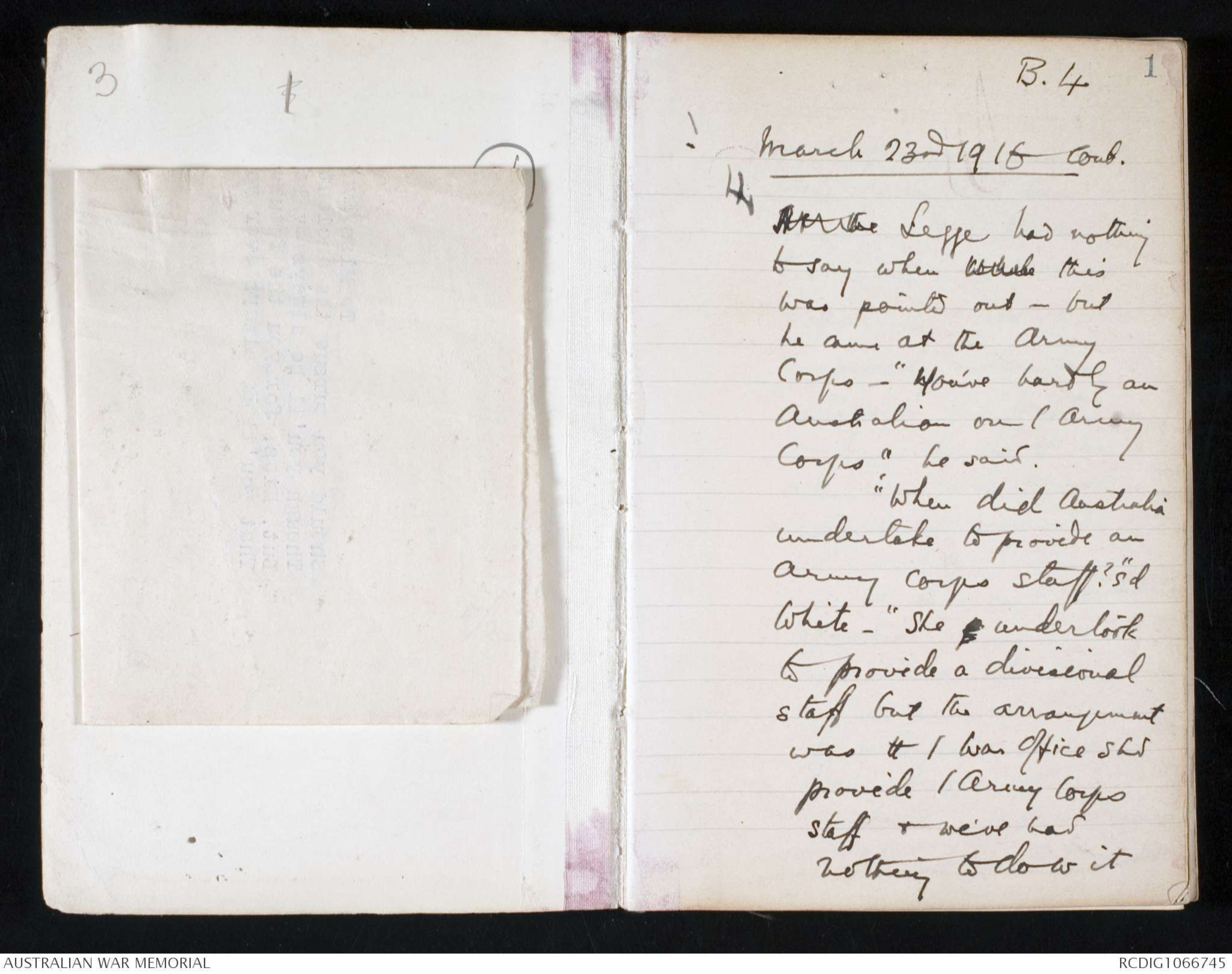
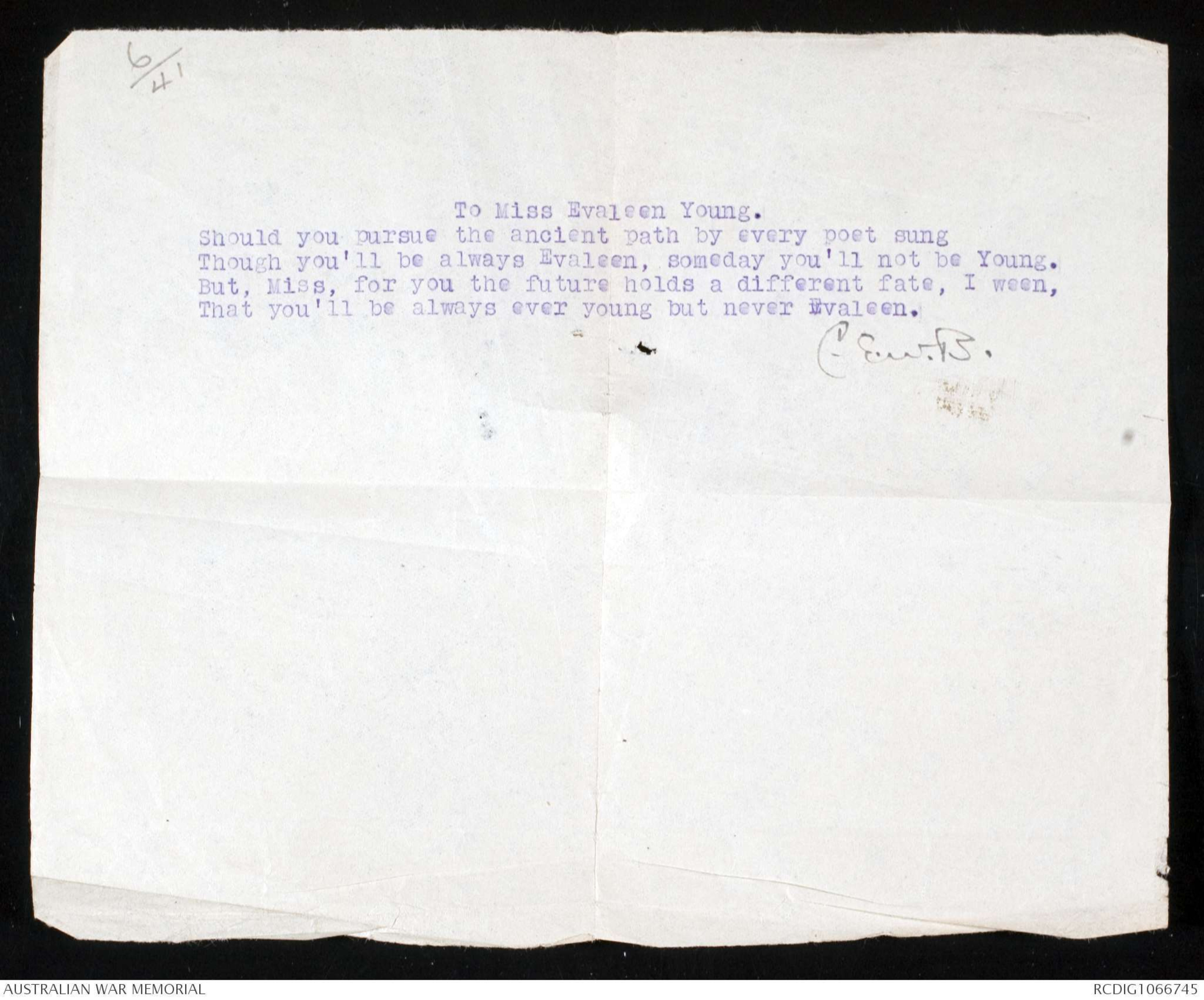
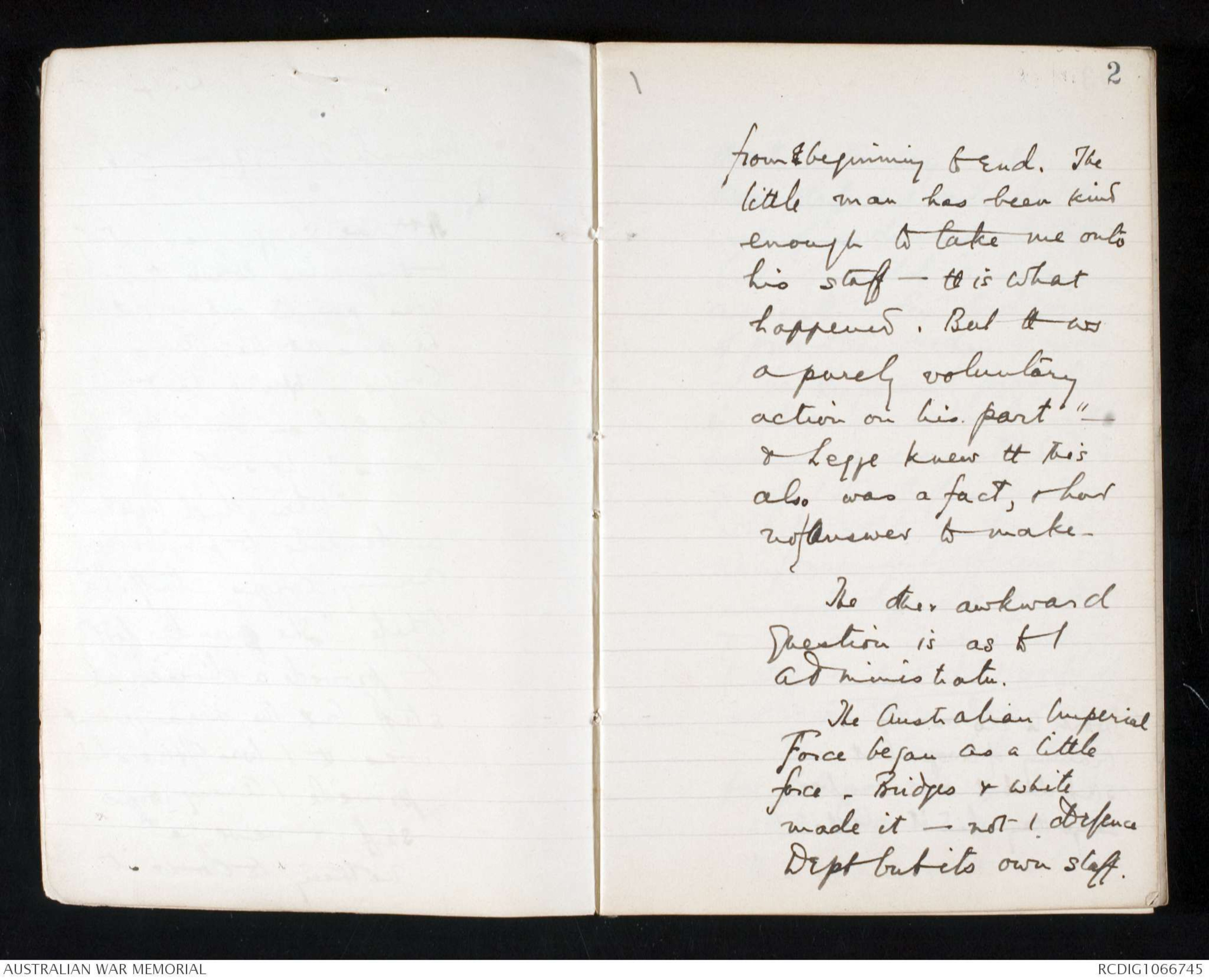
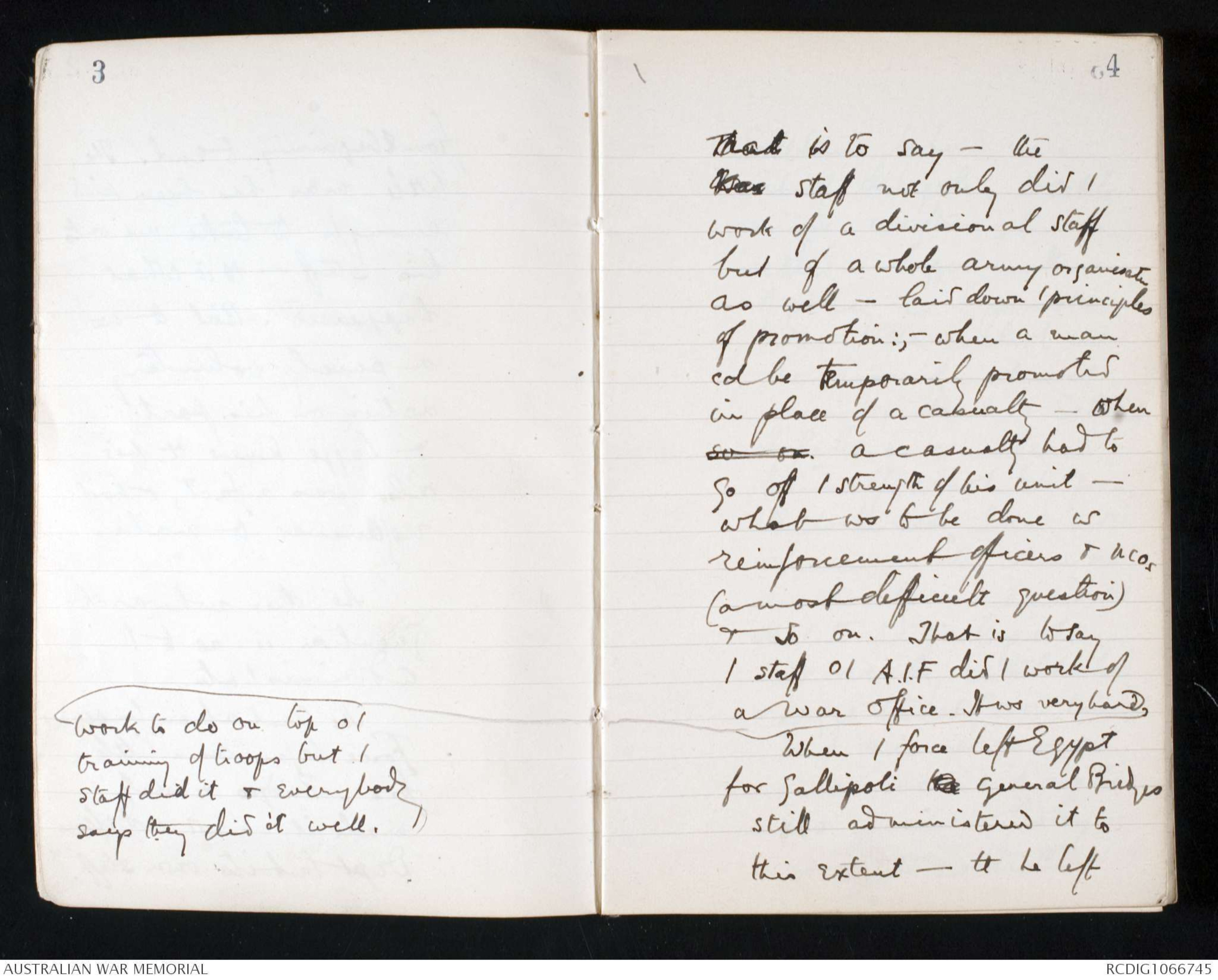
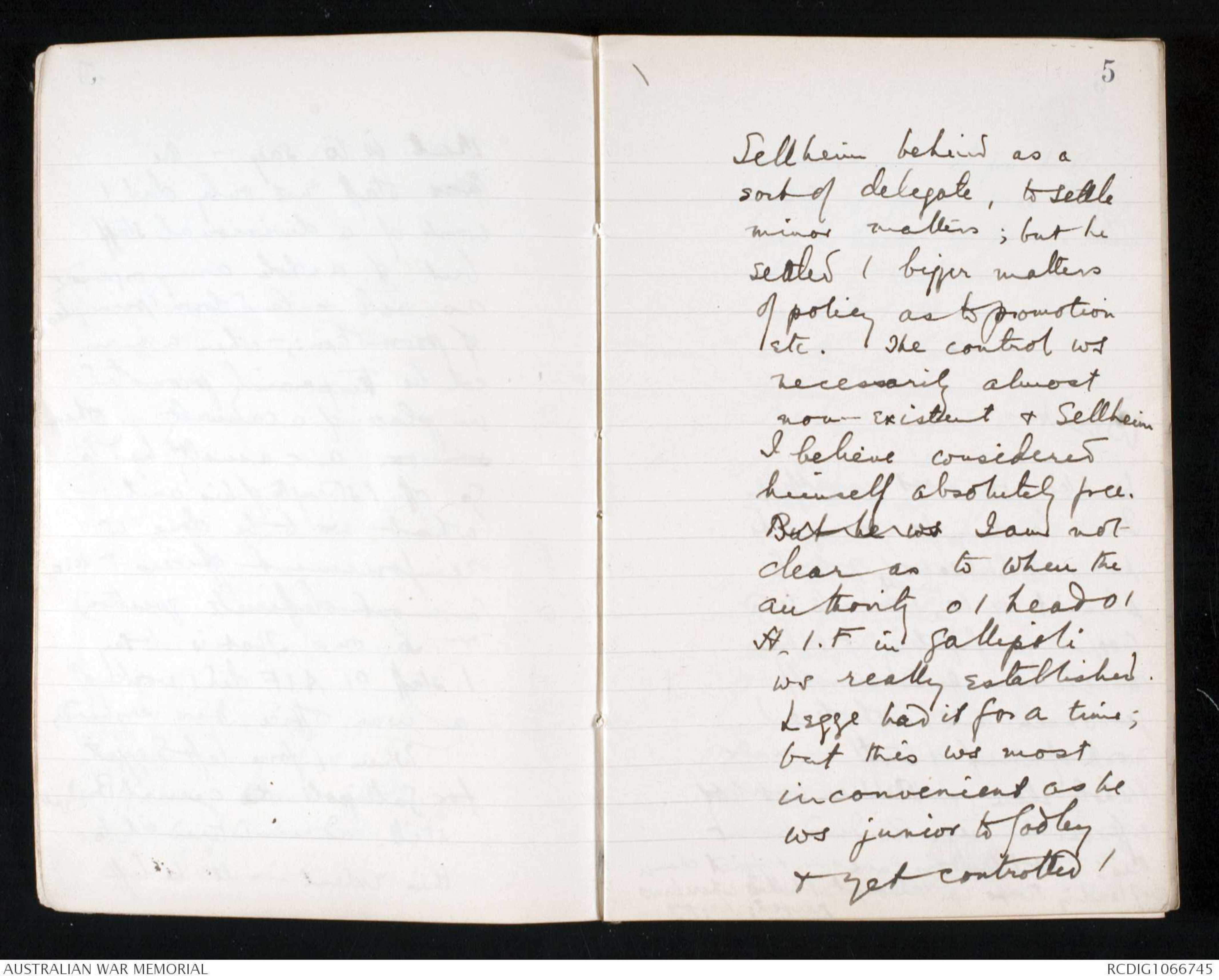
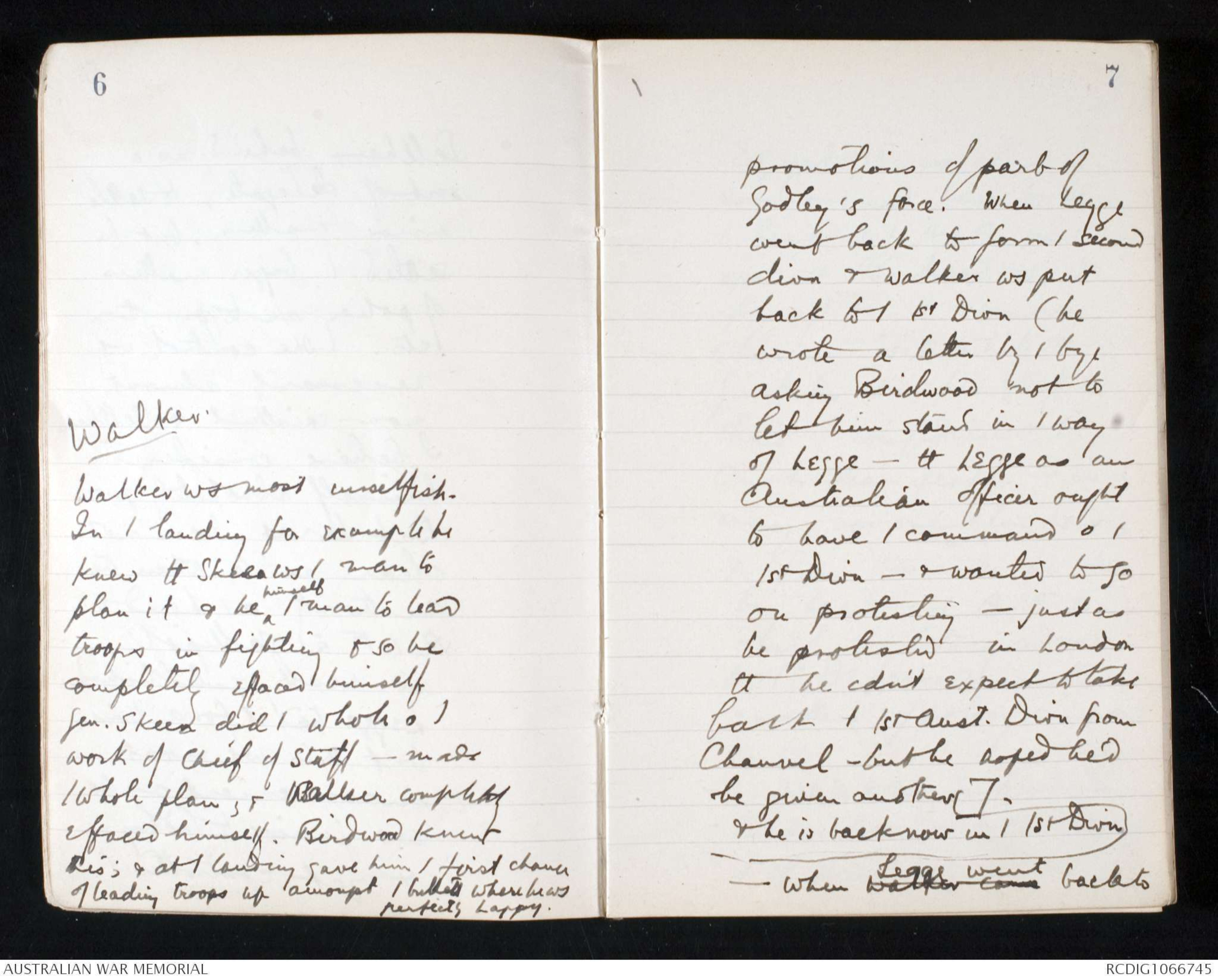
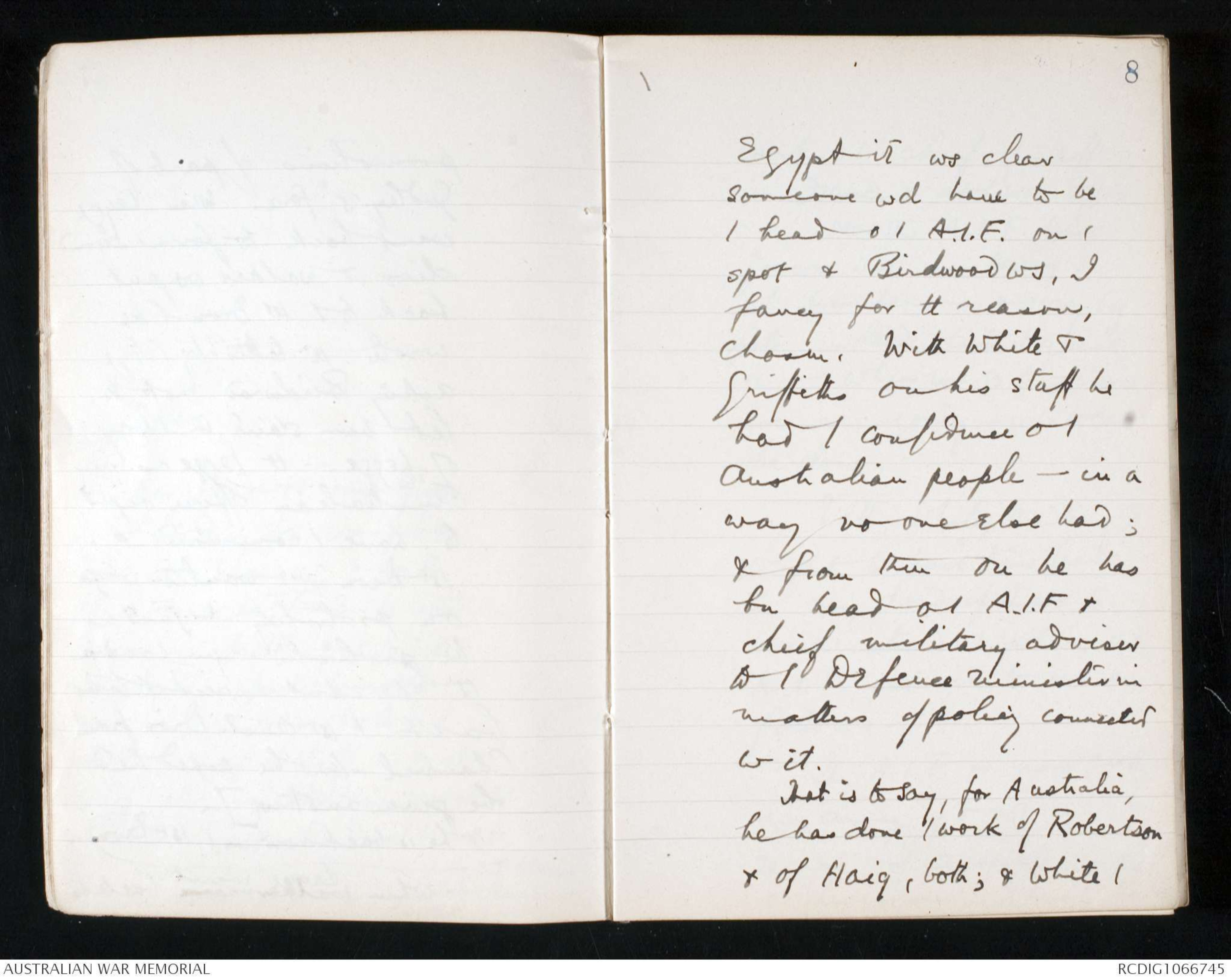
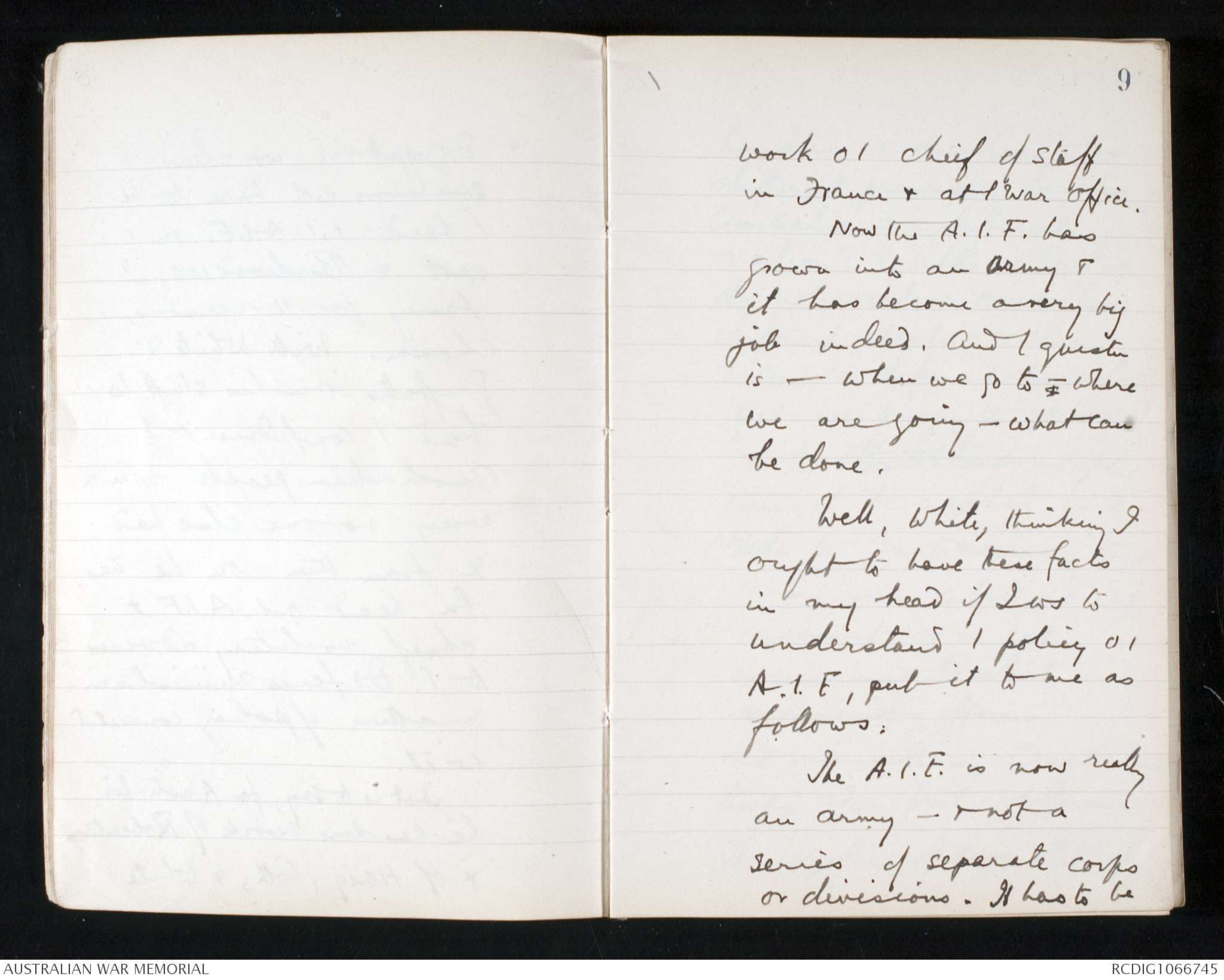
AWM38
Official History,
1914-18 War: Records of C E W Bean,
Official Historian.
Diaries and Notebooks
Item number: 3DR1606/41/1
Title: Diary, March - April 1916
includes references to diary of Sir Carl Jess,
Gallipoli and Lt Leonard Womersley's Suvla Bay
story.
AWM38-3DRL606/41/1
Original
DIARY NO.41
AWM38
3DRL 606 ITEM 41 [1]
DIARIES AND NOTES OF C. E. W. BEAN
CONCERNING THE WAR OF 1914 - 1918
The use of these diaries and notes is subject to conditions laid down in the terms
of gift to the Australian War Memorial. But apart from those terms, I wish the
following circumstances and consideration to be brought to the notice of every
reader and writer who may use them.
These writings represent only what at the moment of making them I believed to be
true. The diaries were jotted down almost daily with the object of recording what
was then in the writer's mind. Often he wrote them when very tired and half asleep;
also not infrequently, what he believed to be true was not so - but it does not
follow that he always discovered this, or remembered to correct the mistake when
discovered. Indeed he could not always remember that he had written them.
These records should, therefore, be used with great caution, as relating only what
their author, at the time of writing believed. Further, he cannot, of course, vouch
for the accuracy of statements made to him by others and here recorded. But he
did try to ensure such accuracy by consulting, as far as possible, those who had
seen or otherwise taken part in the events. The constant falsity of second-hand
evidence (on which a large proportion of war stories are founded) was impressed
upon him by the second or third day of the Gallipoli campaign, notwithstanding that
those who passed on such stories usually themselves believed them to be true. All
second-hand evidence herein should be read with this in mind.
16 Sept., 1946. C. E. W. BEAN.
AUSTRALIAN WAR MEMORIAL
ACCESS STATUS
OPEN
3 1
B. 4
1
March 23rd 1916 cont.xxthe Legge had nothing
to say when xxx this
was pointed out - but
he came at the Army
Corps - "You've hardly an
Australian on / Army
Corps -" he said.
"When did Australia
undertake, to provide an
Army Corps staff?" sd
White - "She x undertook
to provide a divisional
staff but the arrangement
was tt / War Office shd
provide / Army Corps
staff & we've had
nothing to do w it
6/41
To Miss Evaleen Young.
Should you pursue the ancient path by every poet sung
Though you'1l be always Evaleen, someday you'11 not be Young.
But, Miss, for you the future holds a different fate, I ween,
That you’11 be always ever young but never Evaleen.
C.E.W.B.
1
2
from / beginning to end. The
little man has been kind
enough to take me onto
his staff - tt is what
happened. But tt ws
a purely voluntary
action on his part"_
& Legge knew tt this
also was a fact, & had
no/answer to make.
The other awkward
question is as to /
administratn.
The Australian Imperial
Force began as a little
force. Bridges & White
made it - not / Defence
Dept but its own staff.
3
work to do on top o /
training of troops but /
staff did it & everybody
says they did it well. →
1
4
That is to say - theXXX staff not only did /
work of a divisional staff
but of a whole army organisatn
as well - laid down / principles
of promotion:,- when a man
cd be temporarily promoted
in place of a casualty - whenso on. a casualty had to
go off / strength of his unit -
what ws to be done w
reinforcement officers & NCOs.
(a most difficult question)
& so on. That is to say
/ staff o / A.I.F did / work of
a War Office. It was very hard, ↑
When / force left Egypt
for Gallipoli the General Bridges
still administered it to
this extent - tt he left
1
5
Sellheim behind as a
sort of delegate, to settle
minor matters; but he
settled / bigger matters
of policy as to promotion
etc. The control ws
necessarily almost
non-existent & Sellheim
I believe considered
himself absolutely free.But he ws I am not
clear as to when the
authority o / head o /
A.I.F in Gallipoli
ws really established.
Legge had it for a time;
but this ws most
inconvenient as he
ws junior to Godley
& yet controlled /
1
6
Walker.
Walker ws most unselfish.
In / landing for example he
knew tt Skeen ws / man to
plan it & be ^himself / man to lead
troops in fighting & so be
completely effaced himself.
Gen. Skeen did / whole o /
work of Chief of staff - made
/ whole plan, & Walker completely
effaced himself. Birdwood knew
this; & at / landing gave him / first chance
of leading troops up amongst / bullets where he ws
perfectly happy.
1
7
promotions of part of
Godley’s force. When Legge
went back to form / second
divn & Walker ws put
back to / 1st Divn (he
wrote a letter by / bye
asking Birdwood not to
let him stand in / way
of Legge - tt Legge as an
Australian officer ought
to have / command o /
1st Divn - & wanted to go
on protesting - just as
he protested in London
tt he cdn't expect to take
back / 1st Aust. Divn from
Chauvel - but he hoped he’d
be given another].
& he is back now in / 1st Divn
- when Walker came Legge went back to
1
8
Egypt it ws clear
someone wd have to be
/ head o / A.I.F. on /
spot & Birdwood ws, /
fancy for tt reason,
chosen. With White &
Griffiths on his staff he
had / confidence o /
Australian people - in a
way no one else had;
& from then on he has
bn head o / A.I.F. &
chief military adviser
to / Defence Minister in
matters of policy connected
w it.
That is to say, for Australia,
he has done / work of Robertson
& of Haig, both; & White /
1
9
work o / chief of staff
in France & at / War Office.
Now the A.I.F. has
grown into an Army &
it has become a very big
job indeed. And / questn
is – when we go to x - where
we are going - what can
be done.
Well, White, thinking I
ought to have these facts
in my head if I ws to
understand / policy o /
A.I.F, put it to me as
follows:
The A.1.F. is now really
an Army - & not a
series of separate corps
or divisions. It has to be
 Transcriber 6897
Transcriber 6897This transcription item is now locked to you for editing. To release the lock either Save your changes or Cancel.
This lock will be automatically released after 60 minutes of inactivity.